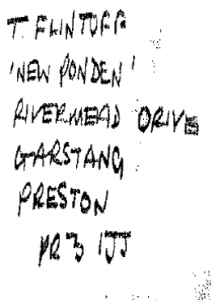Thomas R. Flintoff (1904-1994): Home & Family
Thomas R. Flintoff was born into a working class family in 1904 and spent the whole of his life in Preston. He does not mention his family by name in his memoir but from his description of his home and family life, it is clear they were very important to him.
In his memoir he recalls one of his earliest memories with his father. ‘One of my early recollections is standing holding my father’s hand on the doorstep of the house where I was born, and listening to the church bells ringing.’ (Flintoff, p.1) He was informed of hisfather’s death when he was only ten years old. The memoir emphasises the struggle his mother went through bringing up her family as a single parent.

Like many widowed mothers, Mrs Flintoff, who worked in a local cotton mill, relied on support from her family in bringing up her children. Her early shifts meant she washeavily dependent on her sister, Flintoff’s auntie, who offered help and support. As a day scholar at St Saviour’s infant school, Flintoff recalls his daily routine which involved spending time at his aunt’s house before and after school. He was taken to his aunt’s house by his mother at 5.30am where he received two meals a day including breakfast and his mid-day meal before and after attending school, which was situated close by to his Aunt’s house. With his mother working long hours which Thomas was left alone much of the time.With his mother spending longs hours at work, Flintoff was expected to share in domestic housework. Since he came home from school and later work first he had many household chores to carry out. He came home from Grimshaw Street School at midday and prepared the fire and the table to dine for when his mother returned to make a meal. He also visited the local grocers shop to do the family shopping. Each family member, therefore, played their role in contributing to the running of the home.
Flintoff was acutely aware of the difficulties faced by single parents. ‘One of the most difficult problems which have to be dealt with when parents are working with children in school, difficult where there are two parents, but more difficult for one parent families’. During the school holidays he used to visit relatives in the country where he took a small boat to sail on the local ponds. With no mention of siblings meant he spent much of his school holidays with his father’s cousin who lived in the Tarleton area. They had young sons who he socialised with whilst his mother went to work.
The family home is described in detail by Flintoff which suggest how proud and grateful he was. He lived in a small cottage from being born until he got married. He describes each room in and explains how home improvements were made when the family income increased. The home clearly head great sentimental value to him as he spent all his youth up until he got married at the same house.
He lived in a small cottage from being born until he got married. He describes each room in and explains how home improvements were made when the family income increased. The home clearly head great sentimental value to him as he spent all his youth up until he got married at the same house.
Many working class families at the time did not own their own house. ‘In those days it was very unusual for a house to be sold’. (Flintoff, p. 21) Instead many houses were put up on the market as ‘To Let’. This was the case for the Flintoff family. As a young man, Flintoff was appointed in an office of an Estate and House Agency where he went around properties collecting their rent payment. (Explained in more detail within ‘Life & Labour’ blog)
It wasn’t until the death of the family’s landlord that the Flintoff family found themselves in a position to afford their own house. With experience and knowledge in real estate Flintoff advised his mother that at £200 the offer was too good to turn down. ‘Very few people in the centre of the town owned the houses in which they lived, as they were in rows, and usually the owner had a complete row’ (Flintoff, p. 23) His family’s hard work had payed off and that they could proudly state that they owned their own home, something other working-class families could not afford.
All these contributions Flintoff made to the home, from carrying out household chores to helping his mother buy her own house, highlight the sense of independence he gained from an early age.


Leave a Reply